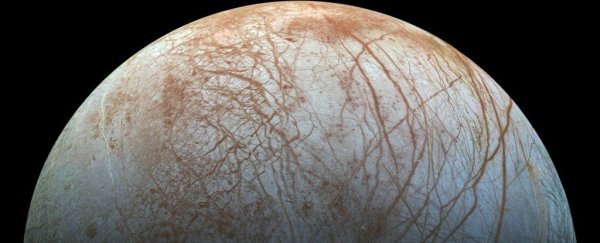NASA will be holding a press conference next Monday to present new findings about "surprising activity on Europa" - more specifically, about evidence of a subsurface ocean on the frozen moon.
If that means nothing to you, Europa is one of Jupiter's many moons, and it's widely considered one of the best candidates for alien life in our Solar System, so it's a pretty exciting announcement.
But aliens are definitely not going to be the focus of this announcement (sorry).
What NASA is telling us so far is pretty vague, but it does say that the findings come from Hubble Space Telescope images of Europa, and are to do with "activity that may be related to the presence of a subsurface ocean on Europa".
This is pretty exciting, because scientists have long suspected that the moon has vast, salty oceans below its crust, but without sending a rover there, we haven't been able to confirm this.
Even cooler, earlier this year, NASA scientists calculated that the chemical balance of Europa's subsurface oceans - if they existed - would be remarkably similar to the ones here on Earth, suggesting there'd be enough hydrogen and oxygen in them for life to form.
So why are scientists so convinced that there's a liquid ocean beneath the frozen surface of a moon almost 500 million miles from the Sun?
First of all there's the unusual smoothness of Europa's surface, as well as the suspected water vapour plumes that have been seen shooting off Europa's surface. And, last year, scientists announced that sea salt appeared to be coating some of the moon's features.
Usually most liquid that far from the Sun would be frozen, but researchers believe that Jupiter has such a strong tidal pull on Europa that it creates enough energy to keep the water sloshing around.
There are also signs this tidal energy is causing geological activity similar to plate tectonics, which could lead to life-forming hydrothermal vents - it's also the first evidence of plate tectonics occurring anywhere outside of Earth.
So, you can see why we're pretty keen for more news on this hypothetical hidden ocean. In fact, telescope observations suggest that Europa could hold two to three times more liquid water than Earth, which is pretty crazy when you think about it.
NASA's press conference sharing all the latest findings will be at 2pm EDT on Monday, and they'll only be live-streaming the audio, which you can listen to here.
And for all of you still holding out hope that there might be some kind of alien announcement, please note that there are no astrobiologists on the line up of participants:
- Paul Hertz, director of the Astrophysics Division at NASA Headquarters
- William Sparks, astronomer with the Space Telescope Science Institute in Baltimore
- Britney Schmidt, assistant professor at the School of Earth and Atmospheric Sciences at Georgia Institute of Technology, Atlanta
- Jennifer Wiseman, senior Hubble project scientist at NASA's Goddard Space Flight Centre
The most exciting part about all of this is that these observations are simply tiding us over until NASA gets the ball rolling on its planned mission to Europa - we can't wait to see this beauty up close.
